Celebrity economy set for explosive growth
Updated: 2016-03-16 08:11
By Meng Jing(China Daily)
|
||||||||
Cyber personalities become prized brands, mint millions, launch businesses, turbocharge online fashion shopping across China
She is neither a movie superstar nor a television personality, but e-commerce sensation Zhang Dayi, 28, is a bigger celebrity with the Midas touch.
Not only do her product endorsements send sales soaring - 5,000 garments in two seconds, equivalent to annual sales of a small bricks-and-mortar store - but she laughs all the way to the bank.
Building her way from a fashion magazine model, Zhang works her magic in China's cyberspace. She posts her photos online. She offers a range of feminine advice on makeup, hairdos, wardrobes, you name it.
Her fan base on Sina Weibo, the Chinese version of Twitter, exceeds 4 million.
Zhang is one of a growing group of influential cyber celebrities who are called Wanghong in Chinese. They target a large, growing segment of Internet users, and are famous.
As more and more people trawl the Internet using their smartphones and other handheld devices, Wanghong, in addition to clinching lucrative product endorsements, are able to ride their fame to establish a new type of money-spinning businesses of their own.
A report from the China Internet Network Information Center showed that in 2015, Chinese people spent 3.75 hours online every day on average.
In May 2014, Zhang set up Wuhuanxide Yichu, or "The Wardrobe I Like" in English, her own online store on Taobao.com, Alibaba Group Holding Ltd's online marketplace, home to more than 8 million hyper-competitive vendors.
Wuhuanxide Yichu sells clothing designed and made by Zhang's team. It has become one of the bestselling female clothes stores on Taobao.com. Monthly sales clocked millions of yuan within the first year of its launch - inconceivable, fantasy-like for many other vendors.
But Zhang's Wuhuanxide Yichu is certainly not an exception.
Statistics from Taobao showed five out of its top 10 female clothes stores by sales in 2015 were owned and led by Internet celebrities.
"These path-breaking stores never advertise nor participate in sales events. Instead, they turn their customers into fans and offer enhanced shopping experience by getting Wanghong to interact with them online. They monetize Wanghong's influence on fans. The so-called Wanghong economy is set for explosive growth," said Wen Zhong, director of Mobile Taobao.
"Every Internet celebrity represents a different style, reflecting different tastes and attitudes of their fans."
That is why, even a small group of fans could spell a fortune for cyber stars.
Ding Chenlin, a veteran entrepreneur in China's e-commerce sector, said in the mobile Internet era, it doesn't take millions of fans to be an Internet celebrity. "If you can cultivate 1,000 loyal fans, you, too, can make something out of it.
"You don't even need to be extremely smart or beautiful to do that. The thing is, you first need to know who you are and what makes you different from the others."
Qi Ting, a 25-year-old from Hunan province, is a typical Wanghong fan. For the past three years, she has been following several Internet celebrities, mainly those in her age-group and others who interact with her.
"They share their views, experiences and expertise. That saves me time as I don't have to go searching online for clothes or bags. The Internet can be confusing, even stressful, as countless items vie for my attention. Also, the clothes recommended by these cyber stars are very suitable for everyday use. Their prices are not that high compared with those advertised and discussed in fashion magazines," Qi said.
A report published by Guotai Junan Securities Co in January said each Internet celebrity is a brand in herself/himself that caters to diverse, fragmented demands of online shoppers. "The market driven by Internet celebrities in China has great potential with the clothes sector alone being estimated at more than 100 billion yuan."
What's more, the overall size of the Wanghong economy is growing as cyber stars are going beyond the fashion industry and into online gaming, travel and baby products, according to the report.
Ge Wei, vice-president of Youku Tudou Inc, a leading online video site in China, said more and more Internet celebrities are publicizing their lifestyle through online videos.
"There are plenty of business opportunities out there as long as you build up a clear image," she said. "We have a travel program made by a Chinese father in Japan. It is basically about taking his two children out to eat and play, to generally have a good time. But every time he uploads a new video, sales of his Taobao shop go up," she said, adding the program has 110,000 subscribers online.
But an online store on Taobao is not essential for Internet celebrities to rake in the moolah. Cooperation with established brands could take the form of embedded subliminal advertisements in their videos, or hyperlinks in their Weibo posts and online articles.
"These cyber stars are not like superstars who need to maintain some kind of image as idols. Cyber stars are more linked to the grassroots, they are not afraid of being themselves, so their programs are more entertaining and better meet the tastes of young netizens," Ge said.
Ding said if someone wants to earn his/her first 100 million yuan the fastest way, they must consider becoming an Internet celebrity.
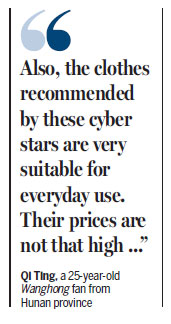
"It's like ... in 2008, the best way to succeed in e-commerce was to open an online store on Taobao. In 2013, it was to open an online store on WeChat, an instant messaging app by Tencent Holdings Ltd. Now, in 2016, the best way is to become an Internet celebrity," Ding said. Internet celebrities not only help boost sales but change the way how products are sold online.
Wen of Mobile Taobao said traditional clothing brands usually choose a certain number of designs out of all the options, based on their sales projections. They then produce clothes in thousands or more for each of the chosen design.
"But Internet celebrities such as Zhang Dayi post photos of themselves. Zhang wears a large number of designs and immediately knows what her potential buyers feel about them. She and her team then decide which one should go into mass production," said Wen.
Internet celebrity-run firms are flexible enough to alter designs, colors and sizes of garments based on the feedback from their fans. This flexibility gives their business the dimension of bespoke tailoring that meets specific needs of fans-cum-customers.
Being a cyber celebrity is not just about publishing a few attractive photos online. According to Wen, 1,000 photos of Zhang Dayi are clicked a day, out of which only a few best ones are selected and published online. This is to ensure her taste for good clothes appears distinctive.
Interacting with followers on Sina Weibo is also important.
"Some of the girls send me messages online not only to exchange ideas on how to dress every day but share their experience of job interviews or finding loved ones. I'm truly happy when hearing about these things," Zhang said in a previous interview.
Ma Si contributed to this story.
mengjing@chinadaily.com.cn
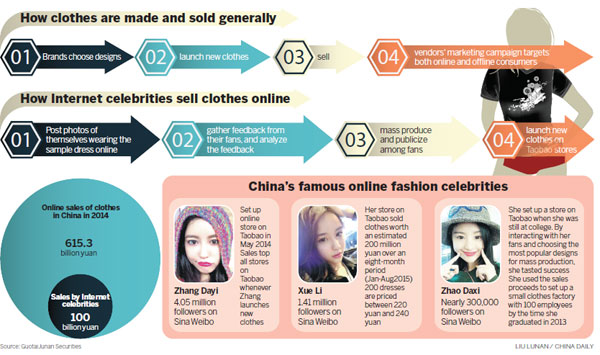
|
(Left) Busy workers of Taobao stores run by Internet celebrities select goods and gifts for their customers. (Right) Internet celebrities, also Taobao store operators, gather in Shanghai for the firsteverWanghong seminar held by Taobao in August 2015. Provided To China Daily |
(China Daily USA 03/16/2016 page16)
- Blue diamond up for auction at Sotheby's
- Apple submits final argument before court hearing on terrorist's phone
- Cuba, US to restore direct mail links
- Kerry to travel to Russia, meet Putin on Syria next week
- Putin says Russians to start withdrawing from Syria, as peace talks resume
- Merkel says Sunday's state elections 'make her party think'
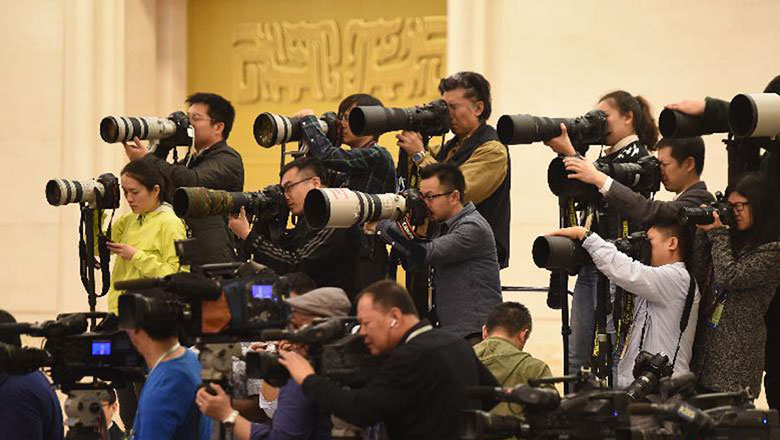
 Infographics: All you need to know about Premier's press conference
Infographics: All you need to know about Premier's press conference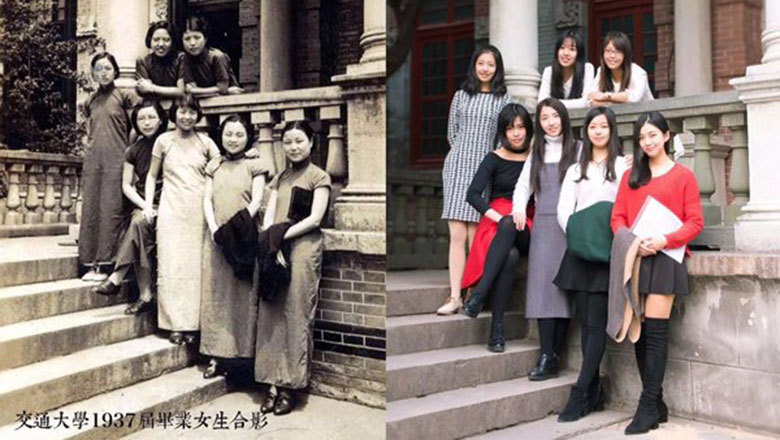
 Now and then photos of Shanghai Jiaotong University
Now and then photos of Shanghai Jiaotong University
 Post-90s quits his job to make traditional paper umbrellas
Post-90s quits his job to make traditional paper umbrellas
 In pictures: Destroying fake and shoddy products
In pictures: Destroying fake and shoddy products
 Armless farmer builds new hands for himself, others
Armless farmer builds new hands for himself, others
 The world in photos: March 7 - March 13
The world in photos: March 7 - March 13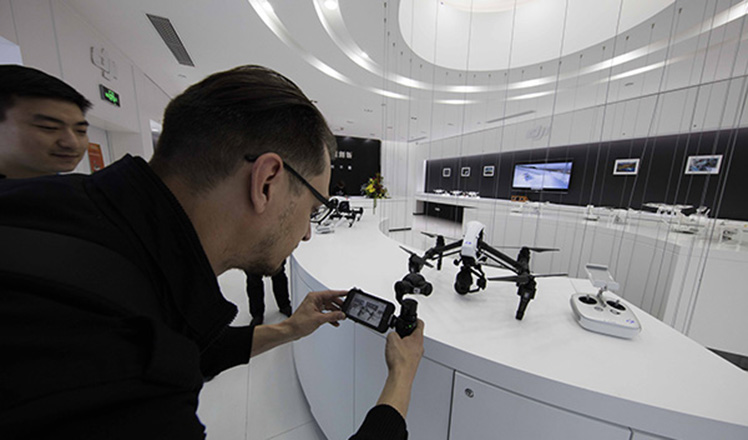
 China's booming IT industry helps drones fly high
China's booming IT industry helps drones fly high
 This 'mermaid' left broadcasting for a watery world
This 'mermaid' left broadcasting for a watery world
Most Viewed
Editor's Picks

|

|

|

|

|

|
Today's Top News
What ends Jeb Bush's White House hopes
Investigation for Nicolas's campaign
Will US-ASEAN meeting be good for region?
Accentuate the positive in Sino-US relations
Dangerous games on peninsula will have no winner
National Art Museum showing 400 puppets in new exhibition
Finest Chinese porcelains expected to fetch over $28 million
Monkey portraits by Chinese ink painting masters
US Weekly

|

|









